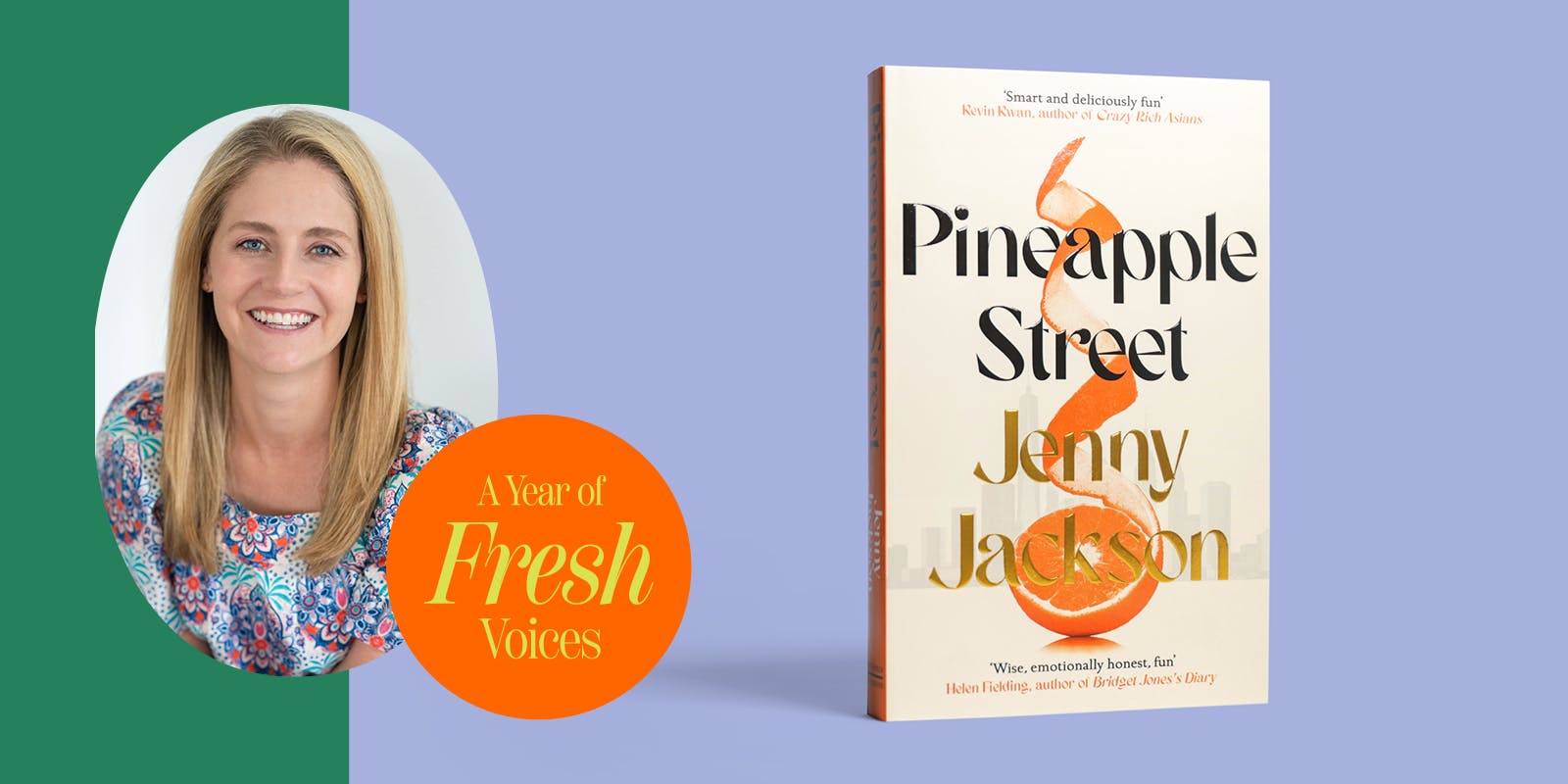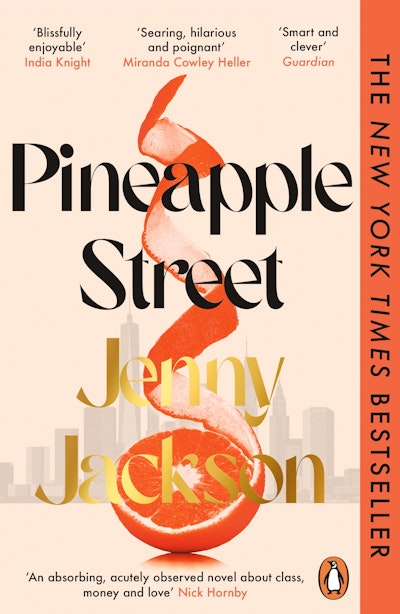We asked Jenny Jackson about her debut novel, her crazy writing routine, and the real-life circumstances that inspired ‘Pineapple Street’.
What was your writing process like when writing Pineapple Street? Did you have a writing routine or any regular rituals?
I would never recommend my writing routine to anyone else! I started writing Pineapple Street during lockdown when I was waking up at 4:30 in the morning and was just unable to get back to sleep.
I decided that I couldn’t just stare at the ceiling for three hours, so I started getting up to write. I became so obsessed that I would wake up thinking about my book and just roll out of bed and start typing at the kitchen table. When my kids needed breakfast, I would pretty much throw them some granola bars and turn on cartoons until I came to a good stopping place. Then in the evenings I would put my kids in the bath and write with a glass of wine while they played in the tub. I basically wrote nonstop for the first four months.
How did you first come up with the idea for the book?
My little family of four spent much of the pandemic living with in-laws; my husband’s parents in Connecticut, and my parents in Massachusetts. It was amazing in ninety-nine ways – they helped with Zoom school and childcare, and we had movie nights and long hikes in the woods – but it was also really funny to see how different our families of origin sometimes felt.
I tease my in-laws about their plants. I think they must have two hundred plants in their house. They take pictures of them and call them their ‘grandbabies’, and I know my husband is mystified by my parents’ crazy art collection. They have tons of friends who are painters and some of their art – like the stuff featuring naked people and cats – is pretty weird.
I wanted to write about that funny feeling of being an outlaw among your in-laws, that feeling that no matter how long you are married you’ll never really get the plant-thing or the naked-people-with-cats-art-thing – you’re never really one of them.
Then, while I was mulling over those ideas, I read an article in the New York Times by Zoë Beery called ‘The Rich Kids Who Want to Tear Down Capitalism’. Beery writes about rich millennial heirs who believe capitalism is a crime and that inherited wealth is intrinsically immoral. These young billionaires are trying to give away their fortunes, much to the chagrin of their families. It got me thinking about what it might feel like for those families to have to examine their own privilege, about who might be capable of change and who might really struggle to question their deeply entrenched views of money. This idea sort of snapped together with the idea of a family novel and grew into Pineapple Street.
What was your big break into publishing?
I have a bit of an inside track as I’ve been an editor at Knopf for twenty years. For me the big break was deciding I was confident enough to share my secret writing project with an agent and reveal myself as a would-be author.
How long have you been working on this book?
About two years. The first draft came together really quickly, but then I spent a long time developing certain character arcs and the book got longer and richer in the second year.
What was the publishing process like (finding an agent, submitting manuscripts, etc.)?
It was unbelievably exciting and strange! Because of my work as an editor, I knew most of the people considering my book. My agent asked if I wanted to do an exclusive submission and keep it small, but I sort of felt like if I was going to do it, if I was going to take off my editor hat and put on my author hat, then I needed to do it a hundred per cent. So, we sent the book out wide. I had phone calls with a whole bunch of editors, and it was truly surreal! I had been having those conversations as an editor for two decades and suddenly I was on the other side. When Pamela Dorman, Nicole Winstanley, and Venetia Butterfield offered pre-empts I was thrilled to take them. I feel like I’ve been matched with my dream editors.
What most excites you about your book being published in 2023?
I’m excited to connect with readers and hopefully make them laugh. Kevin Kwan taught me that he always writes with a post-it note over his computer that says the word “joy,” because he wants to remember that is the centre of his work. I tried that with my book too. As I wrote I kept thinking about how I could make the reader care and laugh. So I’m excited to give that feeling to readers. Then I have the (possibly embarrassing) dream that Pineapple Street might one day be someone’s favourite book. I probably won’t ever meet that person (I mean, except for my mum who will obviously tell everyone it’s her favourite), but the idea thrills me.
Do you have a favourite book or author?
My favourite author of all time is Laurie Colwin. I also love Curtis Sittenfeld, Meg Wolitzer, Hilma Wolitzer, and all things Bridget Jones. Then I publish some of my very favourite authors, like Gabrielle Zevin, Emily St. John Mandel, J. Courtney Sullivan, Kevin Kwan, Jennifer Close, Chris Bohjalian, Lauren Fox, Katherine Heiny and Peter Heller.
What inspired you to become a writer?
Like most writers, I had amazing teachers. Charlotte Gordon was my creative writing teacher in high school, and she made me realise that great storytelling can feel like gossip, joy, and magic.
What did you want to be when you grew up and why?
I wanted to be a writer. In high school, I read everything: Truman Capote, Russell Banks, Anne Tyler, and Alice Munro. In college, I almost got fired from my job as a receptionist for reading Lonesome Dove under my desk! I wanted to get paid to read, so I decided to work in publishing, and I fell so in love with editing that I felt like that was my true calling. And it was for twenty years! It’s been a real surprise to come back to writing in my 40s.
If you could go back in time and give your past self one piece of advice, what would it be and why?
It hurts to throw out good work—good pages, good characters, good stories—but have faith that you have more stories in you and just because you need to cut something more doesn’t mean you won’t be able to use it later.
What is the best writing tip you ever received?
Chris Bohjalian told me that every book tries to kill itself at least once. Don’t give up, perform CPR!













